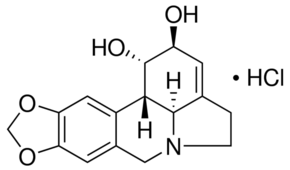All AbMole products are for research use only, cannot be used for human consumption.

Lycorine hydrochloride is a natural alkaloid extracted from the Amaryllidaceae plant family, it is also an HCV inhibitor with strong activity. Lycorine HCl inhibits cell proliferation and induces cell apoptosis in acute myeloid leukemia (AML) cell line HL-60, monocyte leukemia cell line U937, and T-cell leukemia cell line Jurkat. Lycorine also blocks multiple myeloma KM3 cell cycle, induces K562 cell-cycle arrest at the G0/G1 phase and suppresses tumorigenesis and the growth of various tumor cells, including melanoma C8161, ovarian cancer Hey1B, lung cancer A549, glioblatatoma U373, and esophageal cancer OE21.
In vivo, Lycorine exhibits its numerous pharmacological effects on various diseases with very low toxicity and mild side effects. Lycorine hydrochloride effectively inhibits tumor growth in several mouse xenograft models. It effectively inhibits tumor neovascularization. Lycorine has trivial toxicity to normal cells and normal bodies. The animal toxicological experiments show that the 50% lethal death rate (LD50) of lycorine in mice is 112.2±0.024 mg/kg via intraperitoneal injection. The LD50 of lycorine in mice is 344 mg/kg via gastric lavage injection, suggesting that lycorine is very low toxicity in gastrointestinal administration.

Discover Oncology. 2024 Jun 15.
Lycorine attenuated proliferation and induced apoptosis on imatinib-resistant K562 cell by inhibiting autophagy
Lycorine hydrochloride purchased from AbMole
| Cell Experiment | |
|---|---|
| Cell lines | K562 cells |
| Preparation method | Briefly, nuclear proteins were extracted from K562 cells treated with different concentrations of lycorine (2.5 or 5.0 μM) or without lycorine for 24 h. About 50 μg of nuclear protein from each group was added to a 96-well tissue culture plate and HDAC enzymatic activities in the cell nucleus was determined according to the HDAC colorimetric assay kit instructions. |
| Concentrations | 2.5 or 5.0 μM |
| Incubation time | 24 h |
| Animal Experiment | |
|---|---|
| Animal models | SCID mice inoculated with HL-60 cells |
| Formulation | dissolved in DMSO as a stock solution and then diluted in normal saline just prior to usage |
| Dosages | 5 or 10 mg/kg/day |
| Administration | i.p. |
| Molecular Weight | 323.77 |
| Formula | C16H17NO4.HCl |
| CAS Number | 2188-68-3 |
| Solubility (25°C) | DMSO: ≥ 30 mg/mL |
| Storage |
Powder -20°C 3 years ; 4°C 2 years In solvent -80°C 6 months ; -20°C 1 month |
| Related HCV Protease Products |
|---|
| ITMN 4077
ITMN 4077 is a macrocyclic inhibitor against Hepatitis C Virus (HCV) NS3 protease (EC50: 2131 nM). |
| Hepatitis C Virus S5A/5B
Hepatitis C Virus S5A/5B is a synthetic peptide substrate. |
| Ac-D-DGla-LI-Cha-C
Ac-D-DGla-LI-Cha-C is a potent HCV protease inhibitor peptide. |
| Ac-EEVVAC-pNA
Ac-EEVVAC-pNA is a chromogenic substrate for a continuous spectrophotometric assay of HCV NS3 protease. |
| Hepatitis Virus C NS3 Protease Inhibitor 2
Hepatitis Virus C NS3 Protease Inhibitor 2 is a product-based peptide inhibitor of hepatitis C virus (HCV) NS3 protease, with a Ki of 41 nM. |
All AbMole products are for research use only, cannot be used for human consumption or veterinary use. We do not provide products or services to individuals. Please comply with the intended use and do not use AbMole products for any other purpose.


Products are for research use only. Not for human use. We do not sell to patients.
© Copyright 2010-2024 AbMole BioScience. All Rights Reserved.
